- Home
- John Scalzi
Metatropolis Page 2
Metatropolis Read online
Page 2
A cursory analysis of the action reports from the first penetration will show that virtually every picket on the south slopes claimed to have seen Tygre personally on his entrance to our territory. This is clearly impossible, as the deployment patterns were not significantly disrupted that night, as evidenced by comm time-position tags.
As might be expected, the descriptions provided in those action reports vary widely. At least three pickets, specifically alpha-seven, alpha-ten and gamma-three, claim that Tygre’s skin showed stripes in the moonlight. Given that first contact was made by alpha-five, and Bashar’s intervention occurred within alpha-five’s free fire zone, it is impossible for any gamma picket to have witnessed the encounter, and strongly doubtful that alpha-ten saw more than silhouettes.
Yet the action reports possess the intense conviction of passionate eyewitness testimony. Clearly the pickets all believe they saw Tygre.
Citizen Cole has advanced a theory of mass hallucination brought on by biological, chemical or pharmacological agents. However, she offers no possible dispersal mechanism. Citizen Lain has suggested multiple persons in stealth suits or other low-visibility gear, combined with “the power of suggestion.”
It is the opinion of this office that while judgment should be withheld in the details of this matter, there was no significant breach of security other than what was documented by Bashar in his own report. While we are hesitant to simply dismiss the testimony of so many pickets as fantasy, there is no more reliable explanation available. In the meantime, Tygre will continue to be monitored closely, just as he has been since entering the city.
CASCADIOPOLIS welcomes Tygre with dank, mossy arms indistinguishable from any bouldered stand of trees by night. He enters the city silent as mist off the river. Bashar walks before him, point man on a patrol the security chief had never thought to walk.
Prisoners not summarily executed are bound over to the Evaluation Subcommittee. That body is made up of specialists much like Bashar himself, though their focus is on information extraction rather than perimeter security. It is a self-conscious paradox of distributed self-governing communities that such experts emerge in the face of demand. Hydrologists, medics and economic theorists, for example.
Tygre walks behind the back of a man who has not yet understood where the bounds of loyalty lie. The city is among the trees, of the trees, in a way that even the great-souled visitor has not yet understood.
This is the city that is not a city, close kin to the urban pioneers of Detroit but springing from a different resource base. Where the stochastic farms were atop abandoned shopping malls and office blocks, their living spaces distributed and ephemeral within the centuries of civic infrastructure towering above the raddled Michigan earth, Cascadiopolis is built from the basalt bones of the Oregon Cascades.
Seventeen million years ago in response to a crust-busting cometary impact the region drowned in a mantle plume of molten rock that eventually grew to be a mile deep. Basalt fractures as it cools, forming hexagon pillars of seemingly unnatural regularity. The later return of the stratovolcanoes lifted the recognizable peaks of the modern Cascades—Hood, Adams, St. Helens—pulling the mid-section of the Columbia River basalt flow upward with the rising line of mountains. The hidden pillars of the earth cracked as they emerged. The emerging shoulders of the young mountains birthed hidden lava tubes.
In time, all was covered with the rumpled green blanket of lichen, moss, ferns, rhododendrons, and eventually the towering Douglas firs, Western hemlock and lodgepole pines. The old growth forest tops three hundred feet in height, trees of a size unimaginable to city-raised eyes from deep in the east.
Bury your city that is not a city in long lava tubes the size of subway tunnels, build it among the natural pillars framing the cliff faces and ravines, stake it to the flanks of forest giants twenty feet in diameter, spread your trails under vast networks of rhododendrons, draw your water from glacier melt streams and seep springs.
Do all that, build no fires, and you will be invisible to satellite and aerial surveillance. Even thermal imaging gets lost in the deep shadows of those spreading canopies.
Populate your city with biotech engineers, refugee coders, third-generation hippie grass farmers, anyone with skill and will. Place them amid your shadowed outdoor halls with luciferase coldlights engineered from the firefly genome and you have an intelligent, pale constellation beneath the cold roof of night.
Tygre enters this mystical night of chilly shadows and watchful eyes. Bashar stalks before him, a squat and vengeful god already rethinking the virtues of human sacrifice. Tygre knows but does not care—his supreme indifference to the jealousies and violences of the world is among the chiefest of his charms.
The people of Cascadiopolis emerge from their camo netting. Children crawl from beneath thermal blankets tucked inside dripping bushes. A manufacturing team puts down their water-powered lathes and spring-loaded microchip pullers to stare. Fungus farmers abseil down out of the high branches, leaving their reeking troughs unattended. Currency reverse-arbitragers abandon their palm-sized terminals to leave half a million New Yuan stranded in a Flemish forex repository. Shovels in hand, the Labor Subcommittee emerges from the trench of a brownwater pipe project to stare.
Tygre has come to Cascadiopolis, and the city has risen to meet him.
He follows Bashar into the lava tube known as Symmetry. Along with the tubes named Objectivity and Innovation, Symmetry serves as secure storage for anything requiring metal concentrations or chemical shielding, as well as the chambers for the governance necessary to any functioning anarchy. Symmetry is where the Security Subcommittee maintains its weapons caches and its interrogation rooms—those elements of their work not subject to the decentralization ethos by which Cascadiopolis governs itself.
Government is very much on Tygre’s mind, of course, because he has a purpose in all things he does—most of all in stealing a march behind the wall of the most reclusive city in America. Being his own Trojan horse, in effect.
He steps carefully along the resin-soaked fir logs leading down into the mossy darkness of Symmetry. There he will face the first passage of this, his final and greatest performance. The great man whistles as he passes within, a song out of religious history which gives pause to the watching multitudes behind him, their eyes shining with the pallid echoes of destiny walking.
GRADUAL
HAPPINESS Cardoza stalks the Granite Gate. She has spent most of a week in a tiny high-altitude survival shelter buried in leaves and mud almost a half a mile east of the site. Greenie patrols have passed with a dozen feet of her at least twice since then, but she continues invisible.
Though she can be dangerous in the way of hard, competent women and men of her generation, her only weapon on this hunt is a fluid-lens scope. It is a South African import, turked from the far side of the world to bring her a small miracle of static electricity and focused monopole magnetics. Not being a fool, she has much more lethal hardware cached nearby. Just in case.
She doesn’t pretend to understand the physics of the scope, but she certainly understands the operation. Cardoza can count the pimples on the chin of the young greenie currently front-lining Cascadiopolis’ doorway. She can even dial in a fish-eye view of each individual ruddy excrescence.
Quit scratching yourself, Otis, she thinks toward the kid. You’ll have a happier life later on.
No bullet for the guard this mission. His lucky day. Instead she is watching process, to see how often the greenies vary their routines. Cardoza is looking for patterns amid the variations. She knows those patterns are there—no human being is capable of truly random behavior.
Not even the legendary Bashar.
There are only so many viable patrol routes, for example. They have to follow different paths to avoid leaving a trackway in the forest. At the same time, the terrain itself dictates where those patrols must travel, to be effective.
Likewise the guards at the Granite Gate. This one, whom she
has nicknamed Otis, has been on several different shifts. He and his peers switch shifts around for a few days, then rotate back to whatever other labor the collectivist hell of Cascadiopolis has assigned to them.
Their only regular behavior is the manner in which would-be immigrants and traders are processed. A necessity, of course, for such dealings as the greenies have with the wider world. That consistency is the defenders’ weakest point, but it isn’t Cardoza’s ideal approach. Bashar is the polar opposite of a fool, and expects just such a line of attack. Cardoza is certain that if she approached with papers or trade goods she’d be found out.
Perimeter probes had proven disastrous. If her employers were lucky, they might identify the bodies from the skinned corpses hanging in the forest glades. More often, the operatives just vanished. Dead, or swallowed up by the greenies.
Cardoza’s plan is to watch at least a week. She has been creating a baseline of the behaviors at the Granite Gate, identifying all the interdiction activities in play along with whatever she can observe of their patterns and metapatterns of deployment. She also carefully watches who is admitted and who is turned away, in case some detail in that process suggests an approach despite her intuition. She is empowered to make a reconnaissance into Cascadiopolis, opportunity permitting, but no one expects her to do so.
Least of all Cardoza herself. She doesn’t do suicide missions. Not even against greenfreaks.
Eventually she’ll withdraw and make her way back down into the foothills to where her bike is hidden. No two wheelers on these rough slopes. Down below, a long night’s ride to Portland’s West Hills will bring her back to her employers.
Mostly she scans, makes notes, and thinks.
OREGON’S Willamette Valley had been spared much of the worst of what has overtaken the ruins of America. An area once blessed with an overabundance of rainfall retreated into mere shortages, as opposed to the wholesale drought which depopulated the Southwest from central Texas to southern California. Likewise the summer heat was merely unbearable, while the winter hurricanes which first began in the century’s first decade lashed the Northwest without drowning it Gulf of Mexico style.
Still, Portland these days was more like historic Cairo with its cycle of flood-and-drought depositing permanent layers of mud in the downtown streets and rendering the old industrial district of the near southeast virtually worthless.
Most of the money had long since retreated to Dubai, Johannesburg and other centers of twenty-first century wealth. What remained in Portland had climbed the West Hills, bought out the zoning rules and created a series of glittering arcologies for itself. These Escherian constructions were anchored against the already-bizarre fixture of the OHSU hospital complex atop Marquam Hill, folding reliable access to antibiotics, nuclear medicine and worthwhile trauma care into the blanket of such wealth and privilege as remained to dominate the Oregon landscape.
William Silas Crown sat in the sky-spanning penthouse of the Council Crest arcology and stared east toward where Mt. Hood would be if the air were clear enough to see it any more. Crown could recall easily enough his youth when the mountain was a snowbound chevron floating in the silver skies. He still knew where to find it, even if no one under thirty could point to the peak with any confidence.
“Streeter,” he said to the empty air. “Has there been any update on Project Verdancy?”
“No sir,” replied his executive assistant, stepping in from the office next door. She was a willowy woman of mixed Asian extraction, with that strange hyperefficiency that sufficient money could buy. Or at least put on the payroll.
“Meaning reports without status changes, or meaning no reports at all?”
Streeter didn’t even glance at her wrist. “Asset Chi has been bouncing a chirp off the Galileo-II Eurosats on schedule. Keep-alive only, no updates. She is in place and observing as planned.
“Asset Tau penetrated the target last night. No status check since, which is within operational parameters.”
Crown tapped his teeth with his index finger. “And our sources inside?”
“Current status unknown, sir. There has been no evidence of recent compromise.”
“Of course there hasn’t.” Bashar was too good for that sort of thing. Crown would never know, until he realized he didn’t know anything at all.
Still, such a mare’s nest of rogue talent and soft-path tech simply couldn’t be ignored. He was long past believing in the sanctity of much of anything, but some things just shouldn’t be kept hidden.
Not that Cascadiopolis itself mattered a whit. The green-freaks could go camping in the woods until the entire range burned out for all he cared. He didn’t have timber rights, possessed no interest in access control.
Crown was far more interested in the innovation arising from that misguided band of anarchists. Once the geek-American community had wrenched itself away from the forty-year sideshow that had been the software industry and gone back to good old-fashioned hardware—not to mention good new-fashioned biotech—the game had changed. Barely in time, either.
The case study was around gas-in-a-jar. Several California start-ups had engineered petroleum-producing microbes in the late 2000s. The oil shocks arising from the American failures in the Middle East produced the necessary economic boost to kick-start development, but lacking a terminator gene, the bugs had gone home in the pockets of too many lab assistants tired of six dollar per gallon gas.
Within another decade anyone with a high school science education and the talent to brew beer was in the oil production business. And nobody had made any damned money off the greatest revolution in energy production since Colonel Edwin Drake started digging holes in Pennsylvania farmland back before the Civil War.
If these idiots weren’t smart enough to capitalize on their own intellectual property, he would damned well do it for them. The world needed those quiet innovations. At least if anyone planned to keep the lights on much longer. Beachfront condos on the Beaufort Sea were fine for sun worshippers with enough money, like Crown himself.
There were a few billion people starving in place. The greenfreaks weren’t going to keep it all to themselves. Their intellectual property was too damned valuable to be pissed away on hippie dreams. Better someone who could do some good got hold of it.
Crown realized Streeter had been speaking.
“I’m sorry, Evelyn,” Crown admitted. “I lost track for a moment.”
“Carbon, sir.”
“Carbon?”
“They’ve been sourcing carbon nanotubes in laboratory quantities.”
“Not industrial quantities?” he asked.
“No, sir. Not unless they’re running a very small industry.”
He turned that over in his head. Why would the greenfreaks need nominal quantities of carbon nanotubes?
Because they’d found a way of making their own up there in the woods. Charcoal ovens or similar crap, tended by some hyperfocused hippie with a set of nanomanipulators.
“Reference testing, Streeter. They’ve figured out something important, I suspect.”
“May I congratulate you on the fortuitous timing of Project Verdancy.”
Crown laughed bitterly. “In the past five years we’ve traced eleven significant innovations in manufacturing, data management, distributed systems and closed-loop resource management back to Cascadiopolis. And that’s only what we can account for. All of them released open source, so widespread before they were detected that any IP action would be profoundly meaningless, even with an airtight license in place after the fact. Frankly, I would have been more surprised if we didn’t cross paths with some new initiative of theirs.”
Streeter met his look with a small, tight smile. “Very good, sir.” Something odd hung in her tone.
“Very good indeed.” He sighed and tapped his teeth again, wondering what was bothering her. Time to change the subject. “How are you doing on those power futures contracts?”
CARDOZA sees her opening when Otis
is relieved from his post just before moonset. One of Bashar’s lieutenants, whom she thinks of as Chophead, comes out of the shadows followed by a kid even younger and more pimply than Otis. Chophead yells at them for a couple of minutes, then slides back into the deep woods, leaving Otis to walk the new kid around.
The Granite Gate stands empty, an unguarded trilithon which could lead to an earlier age of history. She is not so stupid as to rush it in a quiet moment. There are triplines, monitors, quiet watchers sleeping lightly. No, the opportunity she sees is for social engineering.
This new kid doesn’t know his shoes from his shirt, that much is obvious. Something’s up inside the city, if they’re pulling back all the experienced hands. Cardoza thinks he’ll be on shoot-to-kill orders for anyone who crosses the perimeter—here, that being the path leading from the stub of the old logging railway trestle and down through the ravine to the Granite Gate atop the other side.
Even now Otis walks New Kid around stumbling in the dark, pointing out the perimeter markers, the colored stones that provide ranging points for covering fire, the visible paths and the hidden ones—things he needs to understand and will not remember. Cardoza knows perfectly well there’s no point in bracing Otis, but she’s pretty sure she can keep New Kid from toasting her the minute she comes down the public trail.
It takes time and effort to train someone to kill. New Kid doesn’t have the look. He’s a placeholder, filling in here until someone can push him through some live fire exercises and have him kill an aging yuppie or something, just for the practice.
Cardoza settles in and chews quietly on a cranberry bar. Local produce from the bogs up by the mouth of the Columbia. As if she was a greenie. They aren’t completely crazy, after all. Just a bad case of misplaced priorities. She keeps an eye on the Granite Gate while Otis and New Kid wander, listening to the cadence of their voices as they whisper like bulls blundering through a wheat field.

 Lock In
Lock In Clash of the Geeks
Clash of the Geeks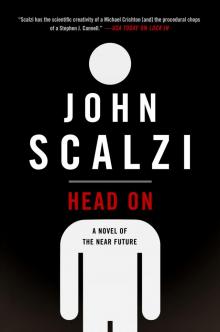 Head On
Head On The Dog King
The Dog King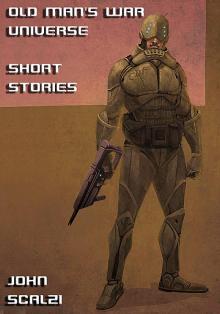 Old Man's War Universe: Short Stories
Old Man's War Universe: Short Stories The End of All Things
The End of All Things Tales From the Clarke
Tales From the Clarke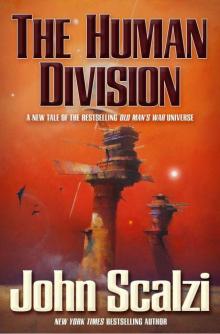 The Human Division
The Human Division The Android's Dream
The Android's Dream An Election
An Election Zoe's Tale
Zoe's Tale Agent to the Stars
Agent to the Stars This Hollow Union
This Hollow Union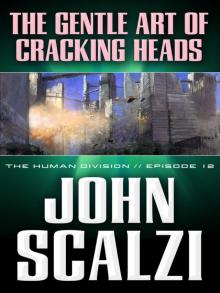 The Gentle Art of Cracking Heads
The Gentle Art of Cracking Heads Old Man's War
Old Man's War The Tale of the Wicked
The Tale of the Wicked Your Hate Mail Will Be Graded: A Decade of Whatever, 1998-2008
Your Hate Mail Will Be Graded: A Decade of Whatever, 1998-2008 Judge Sn Goes Golfing
Judge Sn Goes Golfing The Back Channel
The Back Channel The Human Division 0.5 - After the Coup
The Human Division 0.5 - After the Coup Fuzzy Nation
Fuzzy Nation The Observers
The Observers This Must Be the Place
This Must Be the Place The Last Colony
The Last Colony Unlocked: An Oral History of Haden's Syndrome
Unlocked: An Oral History of Haden's Syndrome A Voice in the Wilderness
A Voice in the Wilderness Redshirts
Redshirts The Collapsing Empire
The Collapsing Empire The Last Emperox
The Last Emperox The God Engines
The God Engines A Problem of Proportion
A Problem of Proportion THAT WAS THE MILLENIUM THAT WAS
THAT WAS THE MILLENIUM THAT WAS The B-Team
The B-Team The Sound of Rebellion
The Sound of Rebellion The President's Brain Is Missing
The President's Brain Is Missing Questions for a Soldier
Questions for a Soldier Walk the Plank
Walk the Plank We Only Need the Heads
We Only Need the Heads How I Proposed to My Wife: An Alien Sex Story
How I Proposed to My Wife: An Alien Sex Story Earth Below, Sky Above
Earth Below, Sky Above Everything but the Squeal
Everything but the Squeal Old Man’s War
Old Man’s War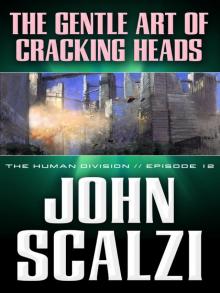 The Human Division #12: The Gentle Art of Cracking Heads
The Human Division #12: The Gentle Art of Cracking Heads This Must Be the Place thd-10
This Must Be the Place thd-10 A Voice in the Wilderness thd-4
A Voice in the Wilderness thd-4 The Observers thd-9
The Observers thd-9 The End of All Things: The Fourth Instalment
The End of All Things: The Fourth Instalment Earth Below, Sky Above thd-13
Earth Below, Sky Above thd-13 Zoe`s Tale вбиос-4
Zoe`s Tale вбиос-4 After the Coup
After the Coup Miniatures: The Very Short Fiction of John Scalzi
Miniatures: The Very Short Fiction of John Scalzi The Last Colony вбиос-3
The Last Colony вбиос-3 Tales From the Clarke thd-5
Tales From the Clarke thd-5 Old Man's War omw-1
Old Man's War omw-1 The Human Division #8: The Sound of Rebellion
The Human Division #8: The Sound of Rebellion The Ghost Brigades omw-2
The Ghost Brigades omw-2 The Sagan Diary (old man's war)
The Sagan Diary (old man's war) The Sound of Rebellion thd-8
The Sound of Rebellion thd-8 The Human Division 13 - Earth Below, Sky Above
The Human Division 13 - Earth Below, Sky Above Head On_A Novel of the Near Future
Head On_A Novel of the Near Future The End of All Things: The First Instalment
The End of All Things: The First Instalment The B-Team thd-1
The B-Team thd-1 The Back Channel thd-6
The Back Channel thd-6 Walk the Plank thd-2
Walk the Plank thd-2 The Human Division #9: The Observers
The Human Division #9: The Observers The End of All Things: The Third Instalment
The End of All Things: The Third Instalment The Human Division #10: This Must Be the Place
The Human Division #10: This Must Be the Place The End of All Things #2: This Hollow Union
The End of All Things #2: This Hollow Union We Only Need the Heads thd-3
We Only Need the Heads thd-3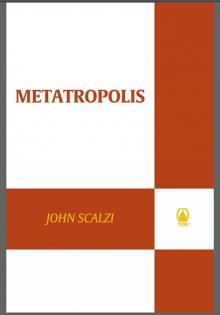 Metatropolis
Metatropolis The Dog King thd-7
The Dog King thd-7 The Consuming Fire (The Interdependency)
The Consuming Fire (The Interdependency) The Human Division #11: A Problem of Proportion
The Human Division #11: A Problem of Proportion